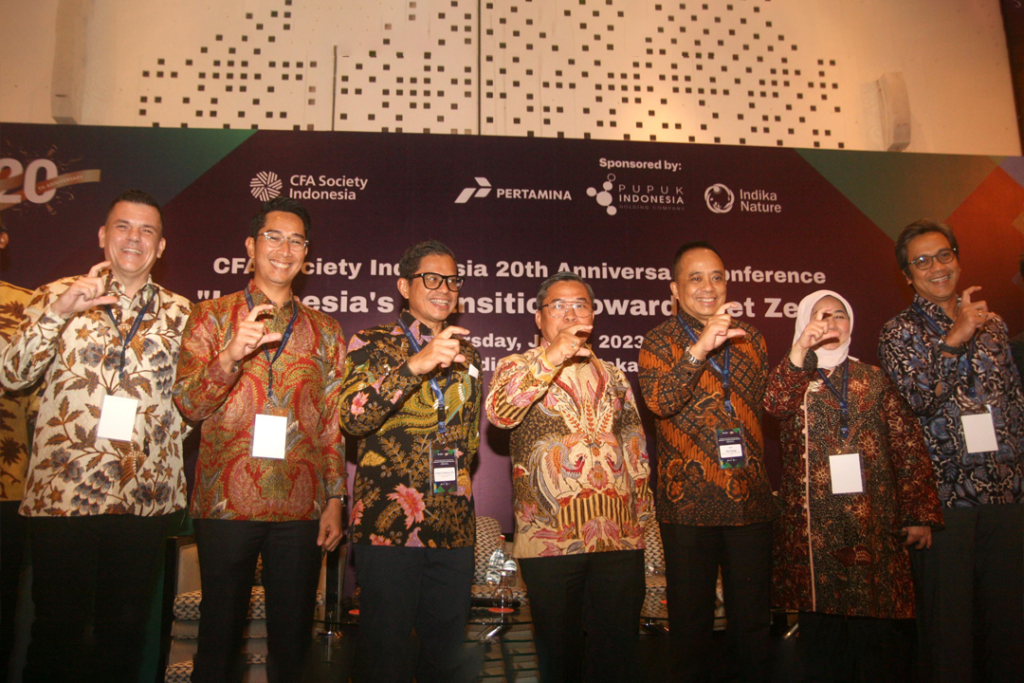Investment professionals affiliated with the CFA Society support the government’s commitment to achieving net zero emissions (NZE).
JAKARTA, July 6, 2023 – PT Mandiri Manajemen Investasi (Mandiri Investasi) believes that investment products emphasizing environmental, social, and governance (ESG) principles will continue to attract investors. This is in line with the increasing concerns of the government, businesses, and society regarding efforts to reduce carbon emissions, with the government targeting net zero emissions by 2060.
Aliyahdin Saugi, CEO of Mandiri Investasi, stated during the 20th CFA Society Indonesia Conference in Jakarta that there has been a significant increase in assets under management (AUM) for investment products, particularly ESG-labeled mutual funds. In 2018, the total AUM for ESG-themed mutual funds was Rp 28 billion, which increased to Rp 480 billion in 2020, and has now reached Rp 630 billion this year. The average annual growth is around Rp 100 billion – Rp 200 billion.
Additionally, there has been an increase in the number of ESG-themed mutual funds being launched. In 2020, there were only five mutual funds, but as of the first half of 2023, the number has reached 21. The increase in AUM is primarily driven by higher returns compared to non-ESG mutual funds.
“For example, the Mandiri FTSE Indonesia ESG Index Mutual Fund, launched last year, achieved a return rate of up to +7%, compared to the negative performance (-5%) of the Jakarta Composite Index (IHSG) during the same period,” said Aliyahdin Saugi, commonly known as Adi.
The Mandiri FTSE Indonesia ESG Index Mutual Fund is the first of its kind in Indonesia, utilizing the FTSE Indonesia ESG Index as its benchmark. The main advantage of the Mandiri FTSE Indonesia ESG Index Mutual Fund over other mutual funds is that it provides investment returns equivalent to the excellent performance of the FTSE Indonesia ESG Index.
“In addition to its outstanding relative performance compared to other indices, this mutual fund carries no risk of sector rotation in the market or active allocation risk. Furthermore, it is designed to have balanced exposure to various sectors, and the FTSE ESG Index is rebalanced only once a year,” added Adi.
Turning to stock performance, based on data from 2016 to 2021, the FTSE Indonesia ESG Index, published by FTSE Russell, recorded the highest stock price growth of 57.56%. This is significantly higher than the 38.11% growth of the LQ 45 Index, which consists of blue-chip stocks, and the 41.49% growth of the IDX30 Index.
Likewise, in the bond market, investor concern for ESG aspects is reflected in the high demand for recent Green Bonds issued by Bank Mandiri. In fact, during the book-building period that ended on June 4, 2023, there was an oversubscription rate of 3.74 times, with the offering value reaching Rp 18.7 trillion, surpassing the target of Rp 5 trillion.
In response to the high interest of businesses and investors in ESG aspects, the Financial Services Authority (OJK) as the regulator plans to issue OJK regulations related to the Carbon Exchange in the near future. In its official statement, the OJK is optimistic that the carbon exchange can be operational within this year.
The increasing prevalence of capital market instruments that prioritize ESG considerations aligns with the aspirations of investment professionals who are members of the CFA Society Indonesia. Pahala N. Mansury, Chairman of CFA Society Indonesia, emphasized that their nonprofit organization is ready to support the government’s commitment to achieve net zero emissions (NZE) by no later than 2060.
“At CFA Indonesia, we are committed to supporting the NZE agenda set by the government by encouraging active participation from businesses and the public. The Ministry of State-Owned Enterprises also supports the development of a roadmap to support NZE,” said Pahala, who is also the Deputy Minister of State-Owned Enterprises I, during the conference held by CFA Society Indonesia.
Share It :Written by











Leave a Reply